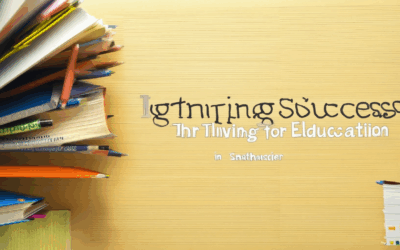Reading academic articles can feel overwhelming for students, especially when navigating through the vast array of databases, understanding complex content, and ensuring access to valuable resources. Whether you’re looking for free academic articles or the best pieces on education, this guide offers practical tips, trusted resources, and clear answers to common questions. From locating reputable platforms like Google Scholar to exploring the differences between scholarly and academic articles, we’ll walk you through everything you need to know to excel in your academic journey. Discover how to access educational articles legally and ethically, while gaining insights into the structure and purpose of these essential documents. This comprehensive guide is designed to empower students with the knowledge and tools needed to succeed, offering a seamless path to understanding and utilizing academic articles effectively.
How Can I Find Academic Articles?
To locate academic articles efficiently, consider the following organized approach:
- Libraries and Librarians:** Start by visiting your school or public library. Librarians often have expertise in guiding you to the right resources and databases.
- Academic Databases:**
- JSTOR:** Access a vast collection of scholarly articles across various disciplines. Check if your institution provides a subscription for free access.
- PubMed:** Ideal for medical and health-related fields, offering a comprehensive database of biomedical literature.
- ScienceDirect and SpringerLink:** These platforms host a wide range of scientific, technical, and medical journals.
- Online Platforms:**
- Google Scholar:** Utilize this tool to perform targeted searches and access full-text articles, often linking to PDF versions.
- arXiv and SSRN:** Explore preprints and working papers in various disciplines on these platforms.
- ResearchGate:** Connect with researchers and find sharing links to their published works.
- University Resources:**
- Institutional Repositories:** Many universities maintain digital archives of faculty publications accessible to students and staff.
- Library Databases:** Your institution likely subscribes to numerous academic databases, providing access to journals and articles.
- Open Access Journals:**
- PLOS ONE and BioMed Central:** These open-access platforms offer peer-reviewed articles freely available to the public.
- Colleagues and Networks:**
- Academic Networks:** Join professional groups or follow researchers on platforms like LinkedIn or Twitter for updates on their work.
- Faculty and Peers:** Reach out to colleagues or professors who may share access to specific articles or resources.
- Citation Management Tools:**
- Zotero and Mendeley:** Use these tools to organize and manage the articles you find, ensuring easy access later.
Good Articles to Read for Students
Enroll Maven offers a curated collection of essential reading materials tailored for students:
- The Power of Learning Strategies – Discover proven techniques to enhance academic performance and study habits.
- College Preparation Guide – Comprehensive insights into navigating the college application process and succeeding in higher education.
- Career Development Tips – Expert advice on building a strong resume, preparing for interviews, and exploring career paths.
- Financial Literacy for Students – Learn how to manage finances, understand budgeting, and plan for future expenses.
Explore these resources and more on Enroll Maven to unlock valuable insights and tools designed to support your educational journey.
Competing platforms like Chegg and Course Hero also offer helpful articles and study guides, ensuring you have access to a variety of reliable resources.
What is an Academic Article?
An academic article is a specialized piece of writing used primarily in scholarly journals and academic publications. These articles present original research, reviews of existing research, or discussions on a particular topic. They are typically written by researchers, scholars, or professionals in a specific field and are intended for an educated audience.
Academic articles serve several purposes, including disseminating new findings, encouraging intellectual discourse, and contributing to the advancement of knowledge in a particular discipline. They often undergo rigorous peer review to ensure quality and relevance.
Key Components of an Academic Article
- Title : A concise and descriptive title that reflects the study’s purpose and findings.
- Abstract : A brief summary of the article’s content, methods, results, and conclusions.
- Introduction : Provides background information, states the problem, and outlines the research objectives.
- Literature Review : Discusses previous studies related to the topic, highlighting gaps and building a case for the current research.
- Methodology : Describes the research design, participants, procedures, and tools used to collect data.
- Results : Presents the findings of the study, often in the form of data, graphs, or tables.
- Discussion : Interprets the results, compares them to previous studies, discusses implications, and addresses limitations.
- Conclusion : Summarizes the study’s findings, highlights contributions to the field, and may suggest future research directions.
How to Read and Understand Academic Articles
- Break Down the Sections : Each part of an academic article serves a specific purpose. Understanding these helps in grasping the overall content.
- Look for Key Terms : Pay attention to terminology specific to the field to better understand the context.
- Use Summaries : Skim through the abstract and conclusion to get a quick overview before diving into details.
- Review References : Check the bibliography to find related works and additional resources for further reading.
By following these guidelines, you can effectively navigate and comprehend academic articles, staying informed about the latest developments in various fields.
How Can I Read Academic Articles for Free?
Reading academic articles for free can be done through various methods:
- Open Access Journals: Look for publications that are freely available online. Some reputable platforms include PLOS ONE and BMJ Open .
- Research Platforms: Websites like ResearchGate and Academia.edu allow researchers to share their work openly.
- University Libraries: Many institutions provide access to academic databases and journals through their libraries. Check your school’s library website to utilize this resource.
- Services Like JSTOR: By registering for a free account, you may access articles through JSTOR . Some articles are available for free under a “Register & Read” program.
- Author’s Websites: Visit the official websites of authors or institutions where the paper was published. Often, authors share their work publicly for download.
- Browser Extensions: Tools like UnpayWall can help locate free versions of articles using DOI links.
Remember to respect copyright laws and always use accessible versions whenever possible. Exploring these avenues can help you access valuable academic content without cost.
Is Sci-Hub Illegal?
Sci-Hub is indeed illegal due to its unauthorized distribution of copyrighted materials. The platform bypasses copyright laws and infringes on the rights of authors, publishers, and institutions that own the academic works accessed through it.
The operation of Sci-Hub violates international copyright agreements and local laws in numerous countries. By providing access to full-text versions of articles behind paywalls, it undermines the legitimate business model of academic publishing and the rights of those who fund and produce scholarly content.
Authors and publishers invest significant time and resources into creating and distributing research, and unauthorized platforms like Sci-Hub deprive them of revenue and recognition. While some argue for open access to knowledge, the illegality of Sci-Hub’s methods makes it a violation of intellectual property rights.
Attempts to shut down Sci-Hub and similar platforms have been made globally, highlighting the widespread recognition of their illegitimacy. Users should respect intellectual property and seek alternative, legal ways to access academic content, such as through institutional subscriptions or open-access repositories.
Are Scholarly Articles Free?
Scholarly articles can vary greatly in terms of accessibility. While many are behind paywalls, particularly for recent publications, there are several ways to access them for free:
- Open Access Journals : These journals allow immediate access to the full text of articles upon publication. Examples include PLOS ONE and BioMed Central .
- Archived Copies : Platforms like JSTOR often provide free access to articles after a specified embargo period, typically 12 months after publication.
- Research Sharing Platforms : Websites like ResearchGate and Academia.edu allow researchers to share their work, sometimes prior to official publication.
- Institutional Access : Many universities and libraries provide subscriptions to databases like ScienceDirect , SpringerLink , and JSTOR , giving students and faculty free access.
- Author Dissemination : Authors may share drafts on platforms like arXiv (for preprints) or through personal websites before formal publication.
While not all scholarly articles are freely accessible, these options provide alternatives for locating free versions of valuable research. Always check the publisher’s website for specific policies regarding embargoes and access.









0 Comments